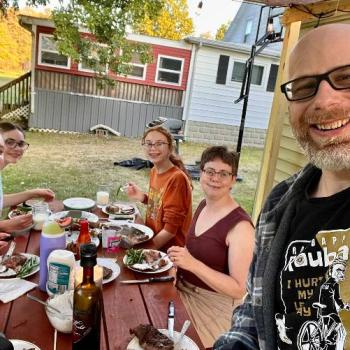When we seek the will of God, we run the risk of finding the God that we are looking for, instead of the God that is. For most Americans, that means looking for the God who inhabits one of two creeds.
One is outlined succinctly by the nation's premier boomer-theologians, Don Henley and Glenn Frey of the Eagles . . .
And we pray to our Lord
Who we know is American
He reigns from on high
He speaks to us through middlemen
And he shepherds his flock
We sing out and praise His name
He supports us in war
He presides over football games
And the right will prevail
All our troubles shall be resolved
We have faith in the Lord
Unless there's money or sex involved
The provenance of this creed is uncertain. Some would trace it to the 19th century, but I am fairly sure that its roots in one form or another can be traced to 1776. It may also have precursors in other countries, because even when people drop theocracies, they find it easier to combine their patriotic and religious commitments.
The other creed is nicely represented—albeit in Rite One language—by essayist and author, Dorothy Sayers in The Creed of St. Euthanasia:
I believe in man,
maker of himself
and inventor of all science.
And in myself, his manifestation,
and captain of my psyche;
and that I should not suffer anything painful or unpleasant.
And in a vague, evolving deity,
the future-begotten child of man;
conceived by the spirit of progress,
born of emergent variants;
who shall kick down the ladder by which he rose
and tell history to go to hell.
Who shall some day take off from earth
and be jet-propelled into the heavens;
and sit exalted above all worlds,
man the master almighty.
And I believe in the spirit of progress,
who spake by Shaw and the Fabians;
and in a modern, administrative, ethical, and social organization;
in the isolation of saints,
the treatment of complexes,
joy through health,
and destruction of the body by cremation
(with music while it burns),
and then I've had it.
The language of this creed has its immediate roots in the Enlightenment, but it has been enhanced at various stages in its development by the random and loose appropriation of economic theories, sociology, and a bit of psychotherapy.
Like its competitor, however, it has far older roots, reaching back to the Tower of Babel, and, arguably, the Garden of Eden. They say "it's hard to keep a good man down." It's also hard to keep any man from thinking he's God.
There are probably other creeds on offer out there, but believe me, they don't get any better. I am sure that I heard somewhere that if Jesus emerges from the tomb and sees his shadow, we have six more weeks of basketball.
With Lent's arrival it is also clear that there are American forms of spiritual practice to accompany this build-a-bear approach to theology.
It turns out that what God wants from the average middle-aged American during Lent is chocolate. You can have your ashes to go, because—heaven knows—we are too busy to face our own mortality (even if we are on a headlong race to the grave). And now we have atheists like Alain de Botton suggesting that we build Agape Restaurants where you can receive a secularized Eucharist (which comes from the Greek for "to give thanks") without needing to thank anyone, never mind God. (Just remember to tip your server.)
While mainline Protestantism tolerantly presides over this aimless concoction of faith and practice, what is the growing religious community in the United States? According to Dr. Susan Trollinger, who teaches at the University of Dayton, it's the Amish. Their numbers are relatively small—250,000 in North America at last count. But over the last two years their membership has grown each year by 10 percent. Their total membership has doubled over the last twenty years and it will double again, this time in fifteen.





